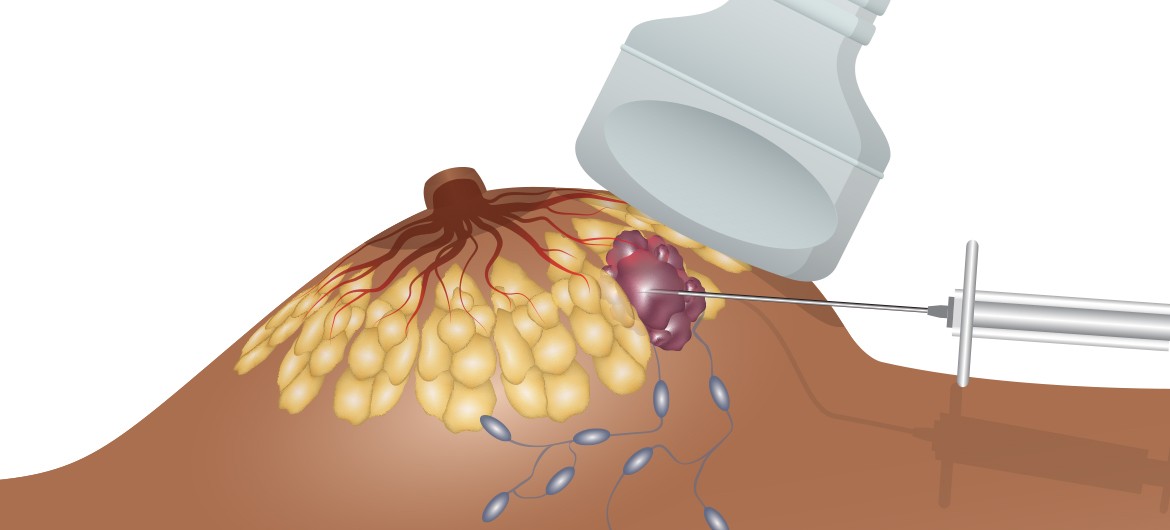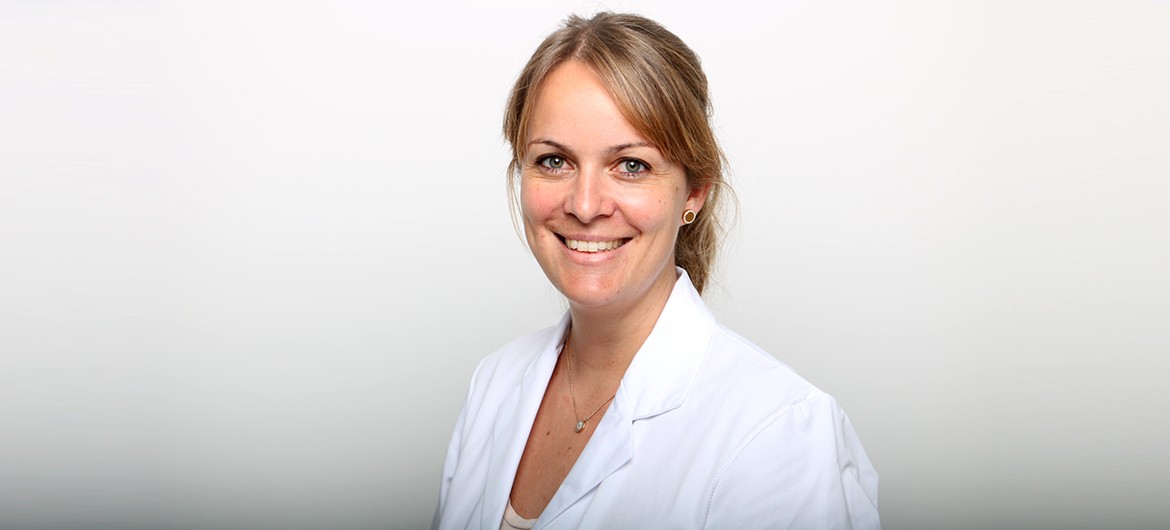Breast cancer treatment at Spital Limmattal – Brustzentrum Zürich Plus
Breast cancer is the most common type of cancer in women, most recently with approximately 6,200 cases per year throughout Switzerland. Rarely, the disease also occurs in men. Breast cancer is a serious disease, but if it is detected and treated in time, it is commonly curable nowadays – and often with relatively gentle treatment. We are happy to answer the most frequently asked questions about this disease.
by Dr. Kathrin Kimmig
In our Brustzentrum (Breast Centre) at Spital Limmattal, breast surgeons, oncologists, radiologists and radiation oncologists work with our colleagues in plastic surgery, pathology, and psycho-oncology in an interdisciplinary team. Our services are complemented by Katharine Röthlisberger, a qualified nurse who has completed additional training as a breast care nurse, and who supports our patients throughout the entire course of treatment and some of their follow-up care.
Since 2021, we have been working with Brust-Zentrum Zürich im Seefeld under the name ‘Brustzentrum Zürich Plus’ as a joint centre with two sites. Both we and our patients benefit from close co-operation with one of the largest breast centres in Switzerland. Breast diseases cause fear and anxiety. We are happy to answer the most frequently asked questions:
Mammograms (X-rays of the breast) are always so painful – is there no other option?
Mammography, along with palpation and breast ultrasound, is still one of the standard methods used in breast diagnostics. In recent years, it has been possible to clamp the breast in the mammogram unit more gently. However, some patients will still find it unpleasant. In some circumstances, a breast MRI scan (magnetic resonance imaging of the breast) can be used to provide us with important additional diagnostic information for determining the type of surgery and further treatment. If there are abnormalities suggesting malignancy, a tissue examination is essential. The tissue sample is taken during a biopsy. Depending on the results, further treatment is decided upon and discussed with the patient.

Diagram of an extraction of a tissue sample from the female breast (biopsy)
Will my entire breast be removed in the event of surgery?
No, in the vast majority of cases breast-conserving surgery is possible. Nevertheless, removal of the whole breast (mastectomy) cannot always be avoided. Possible reasons for this, for example, are an unfavourable tumour-to-breast volume ratio, multiple tumour foci at different sites in the breast, contraindications for radiation therapy, and a high genetic risk for breast cancer.
Removal of the entire breast is an extremely radical procedure and has a major impact on body image and self-perception in those affected. We fully inform all our patients about reconstruction options with either implants or their own tissue, always in close co-operation and consultation with Klinik Swissparc’s plastic surgeons.
Will I have to have radiotherapy?
Often, but not always: radiotherapy is generally required in breast-conserving procedures. However, after a mastectomy, there are circumstances where we recommend radiotherapy, such as cancer in the lymph nodes in the armpit.
Will I have to have chemotherapy?
Not all patients need chemotherapy. The recommendation largely depends on local invasion and the structure and composition of the tumour (tumour biology). For example, if the tumour has so-called hormone receptors on its cell surface then we recommend hormone therapy. Nowadays, this treatment is often preferred as it is better tolerated than chemotherapy, which was often previously administered in such cases. In recent years, a number of other drugs have come on the market that show good results in reducing systemic risk and are generally better tolerated than chemotherapy. However, chemotherapy has not become obsolete and is still relevant. It has simply had to make way for other forms of therapy.
Do I have the same breast cancer as Angelina Jolie?
Due to the so-called ‘Angelina Jolie Effect’, genetic, i.e. hereditary forms of breast cancer have attracted greater public interest. These account for five to ten percent of all breast cancers. In our breast clinic, we evaluate each patient’s individual genetic risk – even without a cancer diagnosis – and make a recommendation as to whether or not a consultation and possibly testing are advisable. If a genetic mutation is present, a prophylactic double mastectomy is often recommended. Reconstruction can be started in most cases at the same time.
Will I ever be healthy again?
This depends on the tumour stage at the time of the diagnosis. Equally important is the previously mentioned tumour biology, which determines, amongst other things, how aggressive the cancer is. Even in advanced breast cancer, mean survival time has significantly increased due to the use of new, innovative therapies. If diagnosed in time and properly treated, most cases of the disease are curable. However, breast cancer can be expected to recur or metastasise even after a long time, so consistent follow-up care is just as important as appropriate and personalised treatment.
Kontakt
Spital Limmattal
Urdorferstrasse 100
CH-8952 Schlieren
Besuchszeiten
Besucher sind täglich von 13.30 bis 20.00 Uhr herzlich willkommen.
Für Eltern von Kindern und Angehörige schwerkranker Patienten gelten Ausnahmeregelungen.
Auf den Privat- und Halbprivatabteilungen können in Absprache mit dem Pflegepersonal individuelle Termine vereinbart werden.
Intensivpatienten können von ihren nächsten Angehörigen und Bezugspersonen, nach Absprache mit dem Pflegepersonal, auf der Intensivstation besucht werden.
